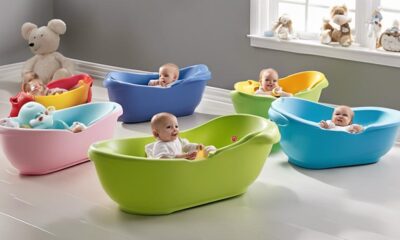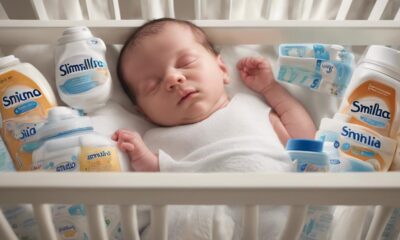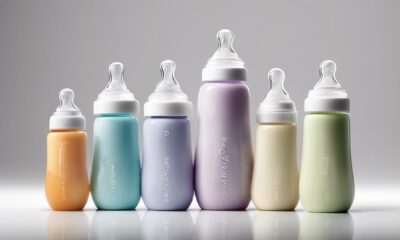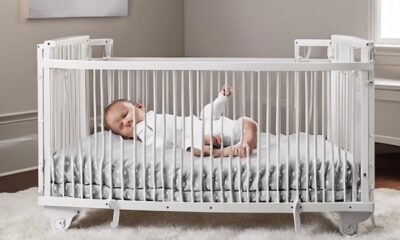Newborn Care
Finding the Right Baby Size: Decoding 73 in Baby Clothes
Lurking within baby clothing sizes, the enigmatic number 73 holds the secret to unlocking the perfect fit for your little one – discover why.
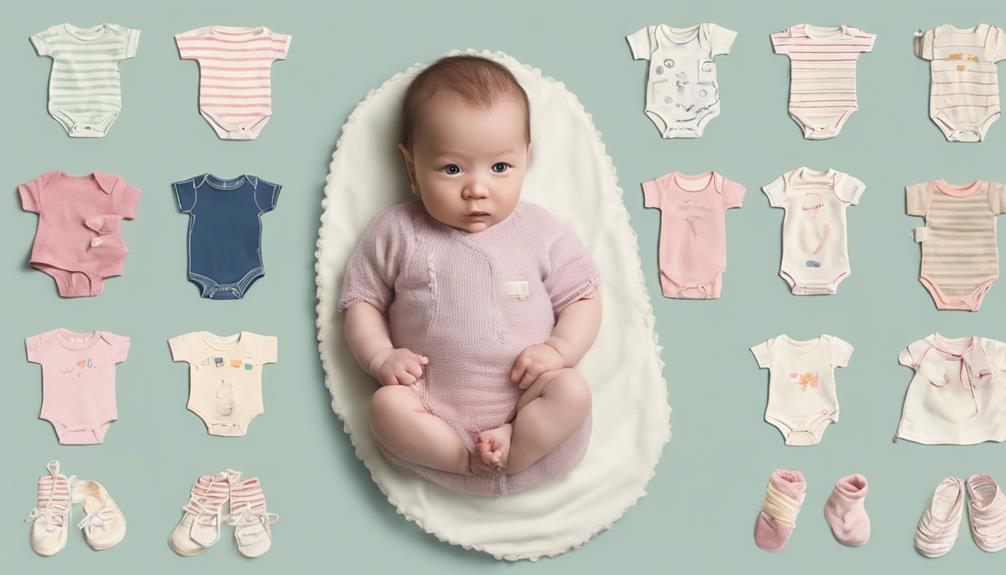
When you’re attempting to decipher the sizes of baby clothing, the number 73 may appear particularly confusing, presenting a level of complexity that you may not have explored before.
Understanding how this numerical enigma correlates to your little one's wardrobe essentials can reveal a world of fitting finesse.
Stay tuned to unravel the mystery behind why size 73 might just be the key to revealing the perfect fit for your bundle of joy.
Key Takeaways
- Size 73 caters to toddlers aged 18-24 months, emphasizing a length of 31-34 inches.
- Weighting 24-28 pounds, toddlers fit well in size 73 European baby clothing.
- Choose size 73 based on height and weight for a precise and comfortable fit.
- Understanding the European numbering system ensures selecting the right size for your growing toddler.
Decoding Baby Clothes Numbering System
Understanding the numbering system used in baby clothes sizes is essential for selecting the right fit for your little one.
When it comes to European baby clothing, the number 73 often signifies the garment's length in centimeters.
This European sizing method aids in determining the appropriate size based on your baby's height.
Each number corresponds to a specific length, ensuring a more accurate fit for your little one.
Understanding Size 73 in Baby Clothing
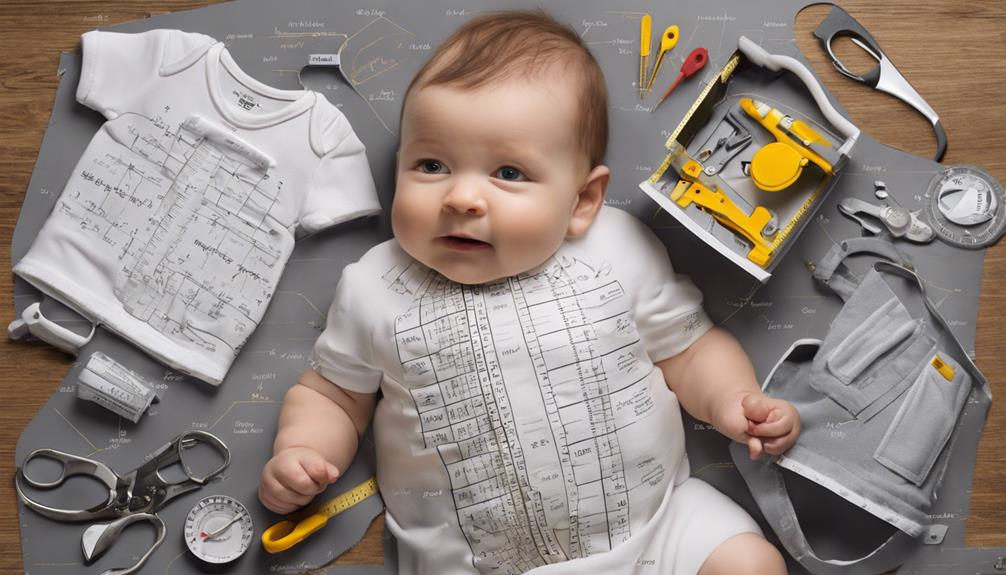
When selecting baby clothing in size 73, consider the weight and height of your toddler for the best fit. Here are some essential points to help you understand size 73 in baby clothing:
- European Sizing: Size 73 in baby clothing aligns with the European sizing standards, specifically tailored for toddlers aged 18 to 24 months.
- Length-Based Fit: European sizing like 73 emphasizes the length of the toddler, approximately 33-36 inches tall, rather than focusing solely on age, ensuring a better fit for your little one.
- Evolving Toddlers: Size 73 is part of the sizing range that assists in evolving toddlers from smaller baby sizes to larger ones as they continue to grow, accommodating toddlers weighing between 22-27 pounds.
Tips for Choosing the Right Baby Size
Wondering how to pick the perfect size for your baby's clothing? When choosing the right size for your little one, it's vital to take into account factors like baby clothes sizes, brands, fit, and accommodating growth. To assist you in making the best choice, here are some helpful tips:
| Tips for Choosing the Right Baby Size | ||
|---|---|---|
| Take into account the Baby's Measurements | Consult Size Charts | Opt for Slightly Larger Sizes |
| When selecting a size, consider your baby's weight and height to guarantee the best fit. | Look for size charts provided by various brands to ensure an accurate size selection based on your baby's specific measurements. | Choosing a slightly larger size than your baby's current measurements can accommodate growth and prevent tight clothing. |
Navigating Baby Clothes Sizing Confusion
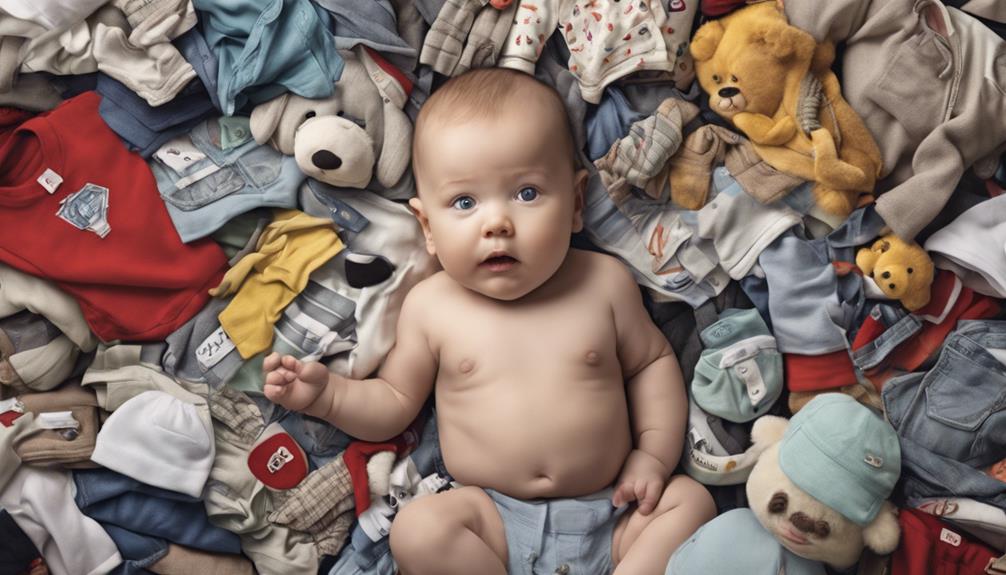
Cracking the world of baby clothes sizing can often feel like deciphering a complex puzzle, with varying standards across brands and regions adding to the confusion. To navigate this maze and make sure you find the perfect fit for your little one, consider the following:
- Consult Brand Sizing Charts: Different brands run differently with regards to sizing. Checking the brand's specific sizing chart can help you determine which size will fit your baby best.
- Understand European Sizing: European sizing tends to focus more on the baby's length rather than age. This approach offers a different perspective on sizing that might better suit your needs.
- Leave Room to Grow: Given how quickly babies grow, opting for clothing with a bit of extra room can make sure that your little one will get more wear out of the garments before outgrowing them.
Ensuring Proper Fit: Size 73 Demystified
To make sure a proper fit for your toddler, understanding the significance of size 73 in European baby clothes sizing is important. Size 73 corresponds to toddlers typically aged 18 to 24 months in European sizing. This measurement is based on your child's height in centimeters, focusing on the child's length rather than age.
In U.S. sizing, size 73 is generally equivalent to 18-24 months and is designed for toddlers weighing between 24 to 28 pounds and standing about 31 to 34 inches tall. When choosing size 73 clothing, it's essential to contemplate your toddler's individual measurements to guarantee the clothing fits properly and comfortably.
Frequently Asked Questions
What Size Is 73 in Baby Clothes?
Size 73 in baby clothes typically fits toddlers around 12-18 months old, weighing 20-27 pounds, or up to 33 inches tall. It corresponds to U.S. sizes 12-18M or 18-24M, depending on the brand and fit.
What Month Is Size 74 in Baby Clothes?
In baby clothes, size 74 typically fits toddlers around 12-18 months old. Remember, sizes may vary between brands, so checking the brand's size chart is key. Finding the right fit for your little one is essential!
How Do I Choose the Right Size Baby Clothes?
When choosing baby clothes, consider their weight and height. Use size charts from brands to match measurements for the right fit. When unsure, go slightly bigger for growth. Prioritize comfort. Varying brands have different size charts.
How Do I Know if My Baby Is the Right Size?
To make sure your baby fits right, compare their height to size 73 clothing. Check the sizing chart for accuracy, as measurements may vary among brands. Selecting the correct size is important for your baby's comfort.
Conclusion
Congratulations! You have officially mastered the art of deciphering baby clothes sizing, including the enigmatic number 73.
Remember, when it comes to dressing your little one, knowledge is power. Keep exploring the world of baby sizes with confidence, trust those sizing charts, and always be prepared to adjust as your baby grows.
With these tips in your arsenal, you'll never be stumped by baby clothing sizes again.
Happy shopping!
With over a decade of experience in editorial leadership, Esther has been at the helm of Mother Baby Kids since its inception. Her journey into parenting content was inspired by her own experiences as a mother, navigating the joys and challenges with a desire to support other parents. Esther is passionate about storytelling that connects, educates, and empowers families from all walks of life.
Newborn Care
Help! My Newborn Can't Poop: A Step-by-Step Guide
Baffled by your newborn's constipation?

As parents, we've all been there – the panic when our newborn just can't seem to go. The frustration mounts, and you find yourself searching for answers.
In our guide, we uncover the secrets to understanding and addressing constipation in your little one. From common causes to simple remedies, we have you covered.
But what happens when these don't work? Stay tuned to discover the important steps you need to take when your baby's bowel movements hit a roadblock.
Key Takeaways
- Monitor stool output and consistency for signs of constipation.
- Try gentle remedies like warm baths and tummy massages.
- Seek medical help if constipation persists or worsens.
- Prevent constipation by ensuring hydration and breastfeeding benefits.
Common Causes of Newborn Constipation
Switching from breast milk to formula can often be a common cause of constipation in newborns. This change can sometimes disrupt the delicate balance in a baby's digestive system, leading to difficulty in passing stools. Additionally, changing formula brands or types may further contribute to constipation issues. It's important to think about other factors such as illness or medication, as they can also play a role in causing constipation in newborn babies. Genetic factors are another aspect to keep in mind when addressing infant constipation.
When faced with a constipated newborn, consulting a doctor is important for identifying the underlying cause and determining the most effective treatment plan. A healthcare provider can offer valuable guidance on managing constipation in babies, ensuring their comfort and well-being. By working closely with a doctor, parents can navigate the complexities of newborn constipation and provide the necessary support for their little one.
Signs of Newborn Constipation

When observing a newborn for signs of constipation, it's important to pay close attention to their stool consistency and frequency. Signs of constipation in a baby may include hard, dry stool and less stool output than usual.
Watch for signs of straining during bowel movements, increased fussiness, and discomfort. Bloating and infrequent, difficult-to-pass stools are common indicators that your baby is constipated. Changes in feeding patterns, formula, or medication can also contribute to newborn constipation.
If you notice these signs, seeking advice from a doctor for guidance is vital. Additionally, gentle techniques like warm baths or leg movements can help alleviate your baby's discomfort and promote bowel movements.
Remedies for Newborn Constipation
After recognizing signs of constipation in a newborn, it's important to ponder gentle remedies that can help alleviate their discomfort and promote regular bowel movements. Here are some remedies to contemplate:
- Warm Baths: A soothing warm bath can help relax the baby's bowel muscles, making it easier for them to have a bowel movement.
- Bicycle Motion: Gently moving the baby's legs in a bicycle motion can stimulate bowel activity and provide relief from constipation.
- Clockwise Tummy Massages: Massaging the baby's tummy in a clockwise direction can aid in digestion and ease the discomfort associated with constipation.
- Avoid Laxatives: It's important to refrain from giving newborns laxatives without consulting a healthcare provider first, as they can have adverse effects.
- Monitor Fluid Intake: Ensuring the baby consumes an adequate amount of fluids, around 700 ml per day, can help soften stools and facilitate bowel movements.
These gentle remedies, when used appropriately, can assist in relieving constipation in newborns and promoting their overall well-being.
When to Seek Medical Help

Seeking prompt medical attention is vital if your newborn hasn't passed meconium within the first 48 hours after birth. Meconium is a baby's first stool, and its absence can indicate a potential issue that requires medical evaluation.
If your newborn continues to experience persistent constipation with no improvement in symptoms, it's important to seek medical help. Additionally, the presence of blood in your newborn's stool is a concerning sign that warrants immediate medical attention.
Keep an eye out for alarming symptoms such as weight loss, vomiting, or a swollen belly, as these may indicate a more serious underlying problem that requires a doctor's consultation.
When basic treatments for constipation in newborns prove ineffective, consulting a healthcare provider is essential for proper evaluation and management. Remember, your newborn's health and well-being are a top priority, so never hesitate to seek medical help when needed.
Tips for Preventing Constipation
To help your newborn avoid constipation, it's important to focus on maintaining their hydration levels and understanding the role of breast milk in promoting softer stools. Here are some tips to prevent constipation in your little one:
- Keep Them Hydrated: Make sure your newborn is getting enough fluids, whether through breast milk or formula, to help soften their stools.
- Breastfeeding Benefits: Breastfed babies often have softer stools due to the natural laxative properties of breast milk, so continue nursing on demand.
- Delay Solid Foods: Avoid introducing solid foods too early, as this can sometimes lead to constipation in newborns.
- Encourage Tummy Time: Regular tummy time and gentle leg movements can help stimulate bowel movements and prevent constipation.
- Consult Your Pediatrician: Before trying any home remedies or interventions, always consult with your pediatrician to ensure the best care for your newborn's delicate tummy.
Frequently Asked Questions
How Do You Move a Baby to Help Them Poop?
We gently move our baby's legs in a bicycle motion and give a warm bath to help stimulate bowel movement. Using a clockwise tummy massage aids digestion. Avoiding laxatives without consulting a healthcare provider is essential for our baby's well-being.
How Long Can a Newborn Go Without Pooping?
I comprehend the worry, but newborns can go up to a week without pooping and still be okay. Changes in formula or diet might affect this. It's common and doesn't always indicate a problem.
What if My Newborn Is Pushing No Poop?
If our newborn is pushing but not pooping, we should gently massage or move their legs to help with digestion. If this persists, seeking advice from a healthcare provider is crucial to make sure no underlying issues exist.
How Do I Stretch My Baby to Poop?
We gently help our baby poop by doing leg exercises, like bicycling, or massaging their belly clockwise to aid digestion. A warm bath relaxes them, making it easier to pass stool. Always consult a healthcare provider before giving laxatives.
Conclusion
As parents, it's distressing when our newborns struggle with constipation. Remember, like a river flowing freely, your baby's digestive system should work smoothly.
With the right knowledge and support, you can help your little one find relief and comfort. Trust your instincts, follow the steps outlined in the guide, and don't hesitate to seek help if needed.
Your baby's health and well-being are worth every effort. Stay strong, you've got this!
With over a decade of experience in editorial leadership, Esther has been at the helm of Mother Baby Kids since its inception. Her journey into parenting content was inspired by her own experiences as a mother, navigating the joys and challenges with a desire to support other parents. Esther is passionate about storytelling that connects, educates, and empowers families from all walks of life.
Newborn Care
How to Determine If Your Newborn's Poop Smells Like Fish
Get ready to uncover the surprising reasons why your newborn's poop might smell like fish – the answer could be crucial for your baby's health!
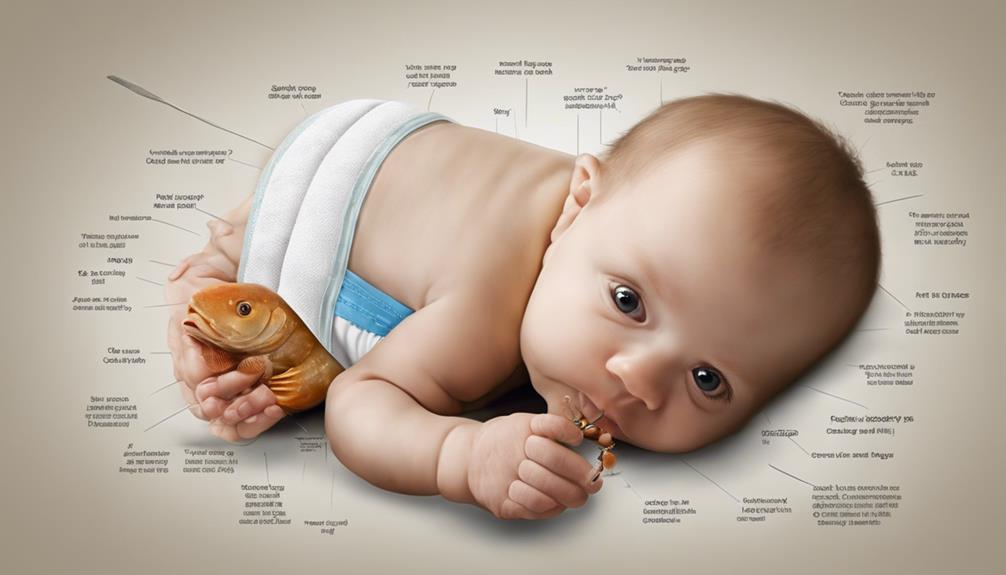
If you've ever wondered what a fish market might smell like in your newborn's diaper, you're not alone. Detecting a fishy odor in your baby's poop can be a cause for concern and prompt a closer look into potential underlying issues.
Understanding the reasons behind this unusual smell is important for your baby's health, and knowing how to differentiate between normal and concerning aromas is critical. Let's explore the nuances of identifying and addressing fishy-smelling poop in newborns to make sure your little one's well-being remains a top priority.
Key Takeaways
- Fishy odor in newborn's poop can indicate health issues.
- Consult a pediatrician for persistent or sudden changes in smell.
- Monitor baby's diet and seek guidance if fish-like smell persists.
- Maintain good hygiene and seek medical help if smell worsens.
Fishy Odor in Newborn's Poop
Fishy odor in a newborn's poop can be a significant indicator of underlying health issues. If a baby's stool emits a fishy smell, it might suggest food sensitivities, especially if the mother is breastfeeding and consuming certain foods. Digestive infections caused by bacteria or parasites can also result in a persistent fishy odor in the baby's poop. Additionally, antibiotic use can disrupt the delicate balance of the baby's gut microbiome, leading to foul-smelling poop with a fishy scent.
In rare cases, a fishy smell in a newborn's poop could signify a more serious condition like bowel obstruction. This requires immediate medical attention. Moreover, green stool with a fishy odor in newborns might be a sign of infections such as salmonella or cholera. These infections necessitate prompt medical evaluation to determine the appropriate treatment and safeguard the baby's health and well-being. If you notice a fishy smell in your newborn's poop, it's essential to consult a healthcare provider for a thorough assessment.
Signs of Unusual Smell in Baby's Stool
Upon noticing an unusual smell in a baby's stool, prompt consultation with a pediatrician is important for proper evaluation and potential intervention. Changes in a baby's poop smell can be a sign of underlying issues that need attention. Here are three signs of an unusual smell in a baby's stool:
- Persistent Fishy Odor: If your baby's stool consistently has a fish-like smell, it could indicate digestive problems, food sensitivities, bacterial infections, or enzyme deficiencies.
- Unusual Smell Changes: Any sudden shift in the odor of your baby's poop, especially to a fishy aroma, should be discussed with a healthcare provider to rule out any concerning issues.
- Accompanying Symptoms: Pay attention to any additional symptoms such as diarrhea, blood in the stool, or signs of discomfort, as these could be indications of an infection or other digestive issues.
Monitoring your baby's stools for any persistent fishy smell and related symptoms is crucial for early detection and appropriate management of potential health concerns.
Identifying Fish-Like Smell in Infant's Poop
Regularly monitoring your newborn's stool for any distinctive odors is important in identifying potential health issues, with a fish-like smell indicating possible underlying concerns. A fishy odor in a newborn's poop can be a sign of infections, digestive problems, or other health issues. Factors such as the mother's diet, food sensitivities, or gastrointestinal infections can contribute to this distinct smell in your infant's stool.
If you notice a persistent fish-like smell, especially when accompanied by changes in stool color or consistency, it's vital to seek guidance from a pediatrician. Monitoring for any unusual smells, including a fishy odor, can help you stay proactive in your baby's health. While some changes in stool odor are normal, a consistent fish-like smell shouldn't be overlooked.
Your pediatrician can provide further evaluation and recommend appropriate steps to address any potential health implications related to your newborn's poop.
Understanding Potential Health Implications
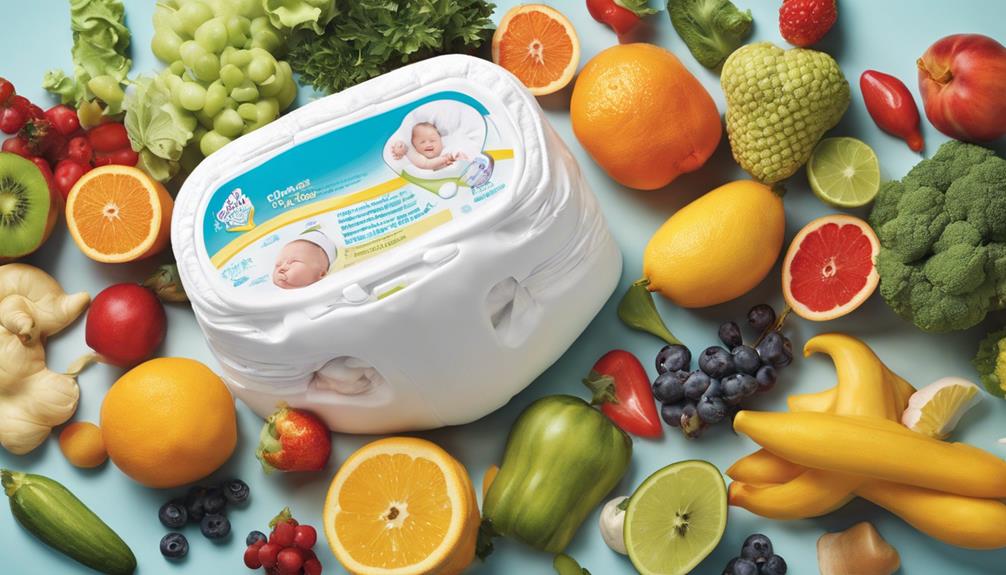
Understanding the potential health implications of a fishy smell in your newborn's poop is important for ensuring prompt medical intervention and appropriate management. When faced with this situation, it's vital to take into account the following:
- Underlying Health Issues: A persistent fishy smell in your newborn's poop could point towards underlying health issues such as gastrointestinal infections, food sensitivities, or conditions like giardiasis. These issues may require specific treatments and interventions.
- Reactions to New Foods: Introducing new foods to your baby's diet can sometimes lead to a change in stool odor. Monitoring your baby's reactions to new foods can help identify potential triggers for the fishy smell.
- Symptoms Monitoring: Alongside the fishy smell, it's important to monitor for other symptoms like diarrhea, vomiting, fever, or decreased appetite. These additional signs can provide valuable information to healthcare providers regarding the potential health implications of the fishy smelling poop.
Steps to Address Fishy Smelling Poop
When addressing fishy smelling poop in newborns, it's important to monitor any persistent odor changes as it could indicate an underlying health concern that requires prompt attention and management.
If your baby's poop smells fishy consistently, consulting with your pediatrician is essential. Additionally, keeping track of your newborn's diet and any recent changes can help identify the source of the odor.
Maintaining good hygiene practices during diaper changes is vital to prevent infections that may lead to a foul-smelling stool. If the fishy smell persists or worsens despite home interventions, seeking medical attention promptly is recommended.
Frequently Asked Questions
Why Does My Newborn's Poop Smell Fishy?
We explore various reasons why a newborn's poop may smell fishy, from food sensitivities in the mother's diet to digestive infections. Antibiotic use and rare bowel obstructions can also contribute. If concerned, seek medical advice promptly.
How Should Newborn Poop Smell?
Our newborn's poop should smell sweet if breastfed or pasty with a mild scent if formula-fed. A persistent fishy odor may suggest an underlying issue. A consistently foul smell isn't normal. Expect some odor, but a strong, fishy aroma warrants attention.
What Does Rotavirus Poop Smell Like?
Rotavirus poop carries a distinct fishy odor due to its impact on the digestive system. Accompanied by symptoms like watery stools and fever, this smell helps identify the viral infection. Prompt medical attention is essential.
What Does Sick Baby Poop Smell Like?
Wondering what sick baby poop smells like? A strong fishy odor can signal serious digestive issues. Seeking medical advice promptly is important, as persistent fishy smells in your newborn's poop may indicate underlying health problems.
Conclusion
To sum up, if your newborn's poop smells like fish, it's important to consult a pediatrician for proper evaluation and guidance. Trust your instincts as a parent and don't sweep potential issues under the rug.
Remember, addressing the fishy smell early on can prevent bigger problems down the line. So, don't be afraid to tackle this head-on and nip it in the bud. Your baby's health is worth the extra effort.
With over a decade of experience in editorial leadership, Esther has been at the helm of Mother Baby Kids since its inception. Her journey into parenting content was inspired by her own experiences as a mother, navigating the joys and challenges with a desire to support other parents. Esther is passionate about storytelling that connects, educates, and empowers families from all walks of life.
Newborn Care
How to Get Rid of Hiccups in a Newborn: A Step-by-Step Guide
Soothe your newborn's stubborn hiccups with expert tips and tricks, but what if these methods don't work?

If your newborn is suffering from stubborn hiccups, here's a step-by-step guide to help ease their discomfort. Understanding the triggers and implementing simple techniques can make a significant difference in soothing your little one.
From gentle burping to utilizing pacifiers strategically, these methods aim to bring relief to your baby. But what if these tricks aren't effective? Stay tuned to discover additional tips and when it might be time to seek professional advice for your hiccuping newborn.
Key Takeaways
- Burp your newborn frequently during feedings to reduce hiccups.
- Use pacifiers to relax the diaphragm and soothe the baby.
- Change positions to help move trapped air upwards and alleviate hiccups.
- Seek medical advice for persistent hiccups or accompanying concerning symptoms.
Causes of Newborn Hiccups
Newborn hiccups, often triggered by diaphragm irritation, can cause involuntary muscle contractions in your baby. These hiccups can start in the womb and continue after birth. Swallowing air during feeding, sudden temperature changes, and stress are common culprits. While it may seem concerning, hiccups in newborns actually help expel excess air from their stomachs and aid in regulating breathing. In fact, preemies hiccup around 15 minutes daily, which can support respiratory muscle development.
To prevent hiccups in your baby, try burping them frequently during feedings to release trapped air. If you're using formula, make sure that the hole in the bottle's nipple is the right size to prevent gulping of air. When breastfeeding, achieve a proper latch to minimize air intake. Additionally, keeping a calm and soothing environment can help reduce stress-induced hiccups. Remember, hiccups are a natural part of your baby's development and usually stop on their own.
Techniques to Stop Hiccups

To help soothe your little one's hiccups, employing gentle techniques can aid in relieving the discomfort they may be experiencing. Here are some effective methods to stop hiccups in newborns:
| Technique | Description | Benefits |
|---|---|---|
| Burping | Burping the baby frequently during and after feedings helps release trapped air and reduce hiccups. | Releases trapped air bubbles in the stomach. |
| Pacifier | Offering a pacifier can help relax the diaphragm and stop hiccups in newborns. | Helps soothe and calm the baby. |
| Position | Changing the baby's position, such as holding them upright, can aid in relieving hiccups. | Assists in moving trapped air upwards. |
| Rubbing | Gently rubbing the baby's back or tummy can help alleviate hiccups by releasing trapped air bubbles. | Provides comfort and aids in digestion. |
Preventing Hiccups in Newborns

To prevent hiccups in your newborn, guaranteeing proper feeding practices is key. Here are some essential tips to help you prevent hiccups in your little one:
- Burp Your Baby: Make sure to burp your baby frequently during feedings to reduce air intake and lower the chances of hiccups.
- Paced Bottle Feeding: Utilize paced bottle feeding techniques to control the milk flow and prevent your baby from swallowing excess air.
- Keep Your Baby Upright: Keeping your baby in an upright position while feeding can aid in burping and decrease the likelihood of hiccups.
- Use the Correct Nipple Size: Opt for the appropriate nipple size for bottle-feeding to minimize air ingestion and potential hiccups.
- Proper Latch: Guarantee a proper latch during breastfeeding to reduce air swallowing, which can help prevent hiccups in newborns.
When to Seek Medical Advice
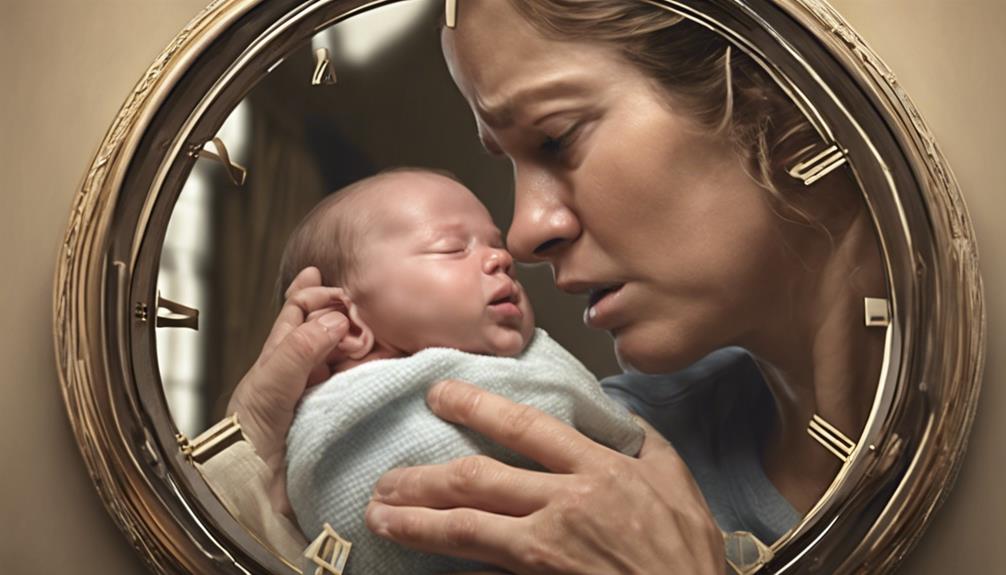
If your newborn's hiccups persist for hours without resolving, seeking medical advice is crucial to ensure their well-being. While hiccups are common in newborns, prolonged or frequent hiccups that disrupt feeding schedules or sleep patterns may require attention from a healthcare professional.
If your baby seems distressed or if the hiccups are accompanied by other concerning symptoms such as vomiting or fever, it's essential to consult a healthcare provider promptly. Trust your instincts as a parent; if you have any worries about your baby's health related to persistent hiccups, seeking medical advice is the best course of action.
Summary and Next Steps
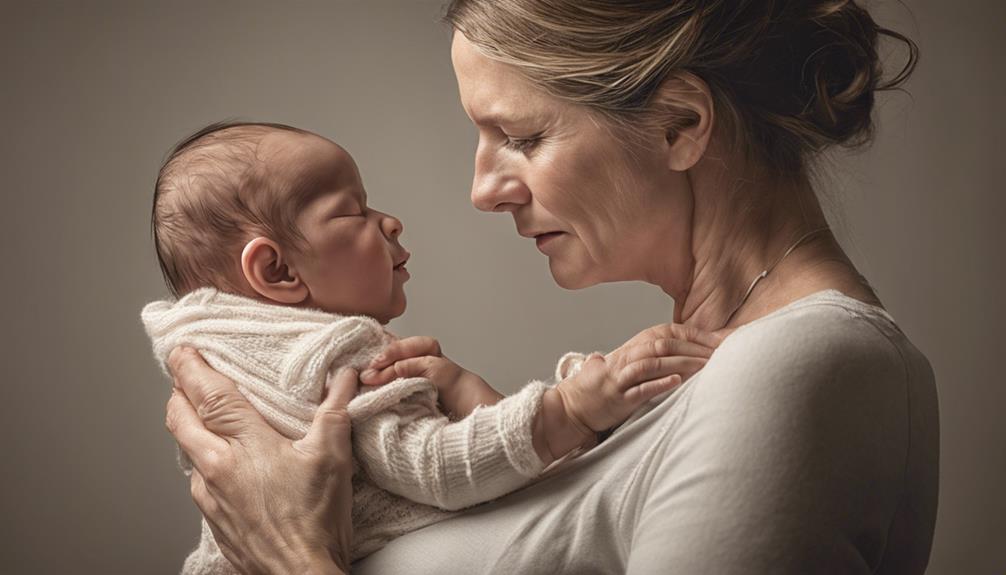
Considering the common occurrence of newborn hiccups, let's review some helpful strategies to manage them effectively. Newborn hiccups are typically harmless but can be distressing for both the baby and the caregiver. Here are some key steps to address and prevent hiccups in your little one:
- Burp Your Baby: Ensuring your baby is properly burped during and after feedings can help reduce the likelihood of hiccups.
- Offer a Pacifier: Allowing your baby to suck on a pacifier can sometimes help alleviate hiccups by regulating their breathing.
- Change Baby's Position: Gently changing your baby's position, such as holding them upright or placing them on their tummy, can aid in stopping hiccups.
- Feed Smaller, More Frequent Meals: Opt for smaller, more frequent feedings to prevent your baby from swallowing excess air, which can lead to hiccups.
- Seek Medical Advice if Needed: If your baby experiences persistent hiccups or if you notice any other concerning symptoms, it's crucial to consult with a healthcare provider to rule out any underlying medical concerns. Remember, always prioritize gentle measures when addressing newborn hiccups.
Frequently Asked Questions
How Do I Relieve My Newborns Hiccups?
To relieve your newborn's hiccups, try burping them frequently during feedings, offering a pacifier for relaxation, changing their position to release trapped air, and gently rubbing their back or tummy to soothe them. Avoid adult remedies.
What Is the Best Position for Baby Hiccups?
When soothing baby hiccups, cradle your little one upright, supporting their back gently. This position aids in releasing trapped air bubbles, easing irritation, and relaxing the diaphragm. Keeping their head slightly elevated above the stomach can help.
Is It OK to Lay Baby Down With Hiccups?
It's generally safe to lay your baby down with hiccups if they're comfortable. Hiccups are common in newborns and won't typically be worsened by lying down. Monitor their comfort and seek advice if hiccups persist.
How to Get Rid of Hiccups Fast?
When hiccups hit your newborn, try patting their back, offering a pacifier, adjusting feeding positions, and burping them often. Avoid adult remedies or startling your baby. These gentle methods can help stop hiccups and keep your little one comfortable.
Conclusion
So, now you know how to help your newborn with hiccups. Remember to burp them regularly, use pacifiers, and avoid adult remedies.
By following these simple steps, you can help alleviate your baby's hiccups and guarantee they're comfortable and happy.
If hiccups persist or if you have any concerns, don't hesitate to seek medical advice. Your little one will be hiccup-free in no time!
With a rich background in writing and a keen interest in child development, she specializes in creating insightful, compassionate content that speaks directly to parents’ concerns and aspirations. Margaret believes in the power of shared experiences to bring comfort and confidence to parents everywhere.
-

 Newborn Care3 months ago
Newborn Care3 months agoWhy Is It Important to Distinguish Between Normal Newborn Bowel Movements and Diarrhea?
-

 Newborn Care3 months ago
Newborn Care3 months agoNewborn Poop: How to Identify Watery Yellow Stools
-

 Newborn Care2 months ago
Newborn Care2 months agoBest Position to Help Newborn Poop: A Step-by-Step Guide
-

 Breastfeeding/Formula Feeding3 months ago
Breastfeeding/Formula Feeding3 months agoWeight Loss Diet While Breastfeeding: Top Tips for Success
-

 Breastfeeding/Formula Feeding2 months ago
Breastfeeding/Formula Feeding2 months agoBalanced Diet While Breastfeeding: A How-To Guide
-

 Breastfeeding/Formula Feeding3 months ago
Breastfeeding/Formula Feeding3 months ago10 Keto Diet Tips While Breastfeeding
-

 Newborn Care3 months ago
Newborn Care3 months agoQuick Ways to Relieve Hiccups in Newborns
-

 Sleep Training3 months ago
Sleep Training3 months ago5 Reasons Your Newborn Might Be Shivering in Sleep











